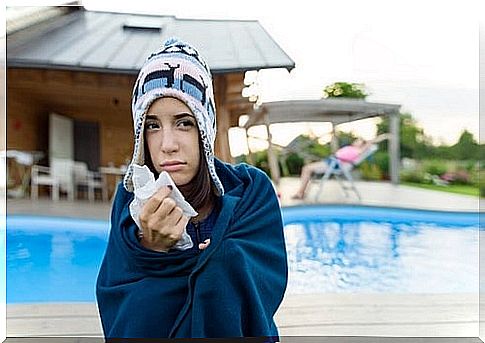Can Chlorine In Swimming Pools Cause Allergies?

With the end of summer, it’s back to the city. Many, in order not to give up the benefits of swimming, regularly practice sports in the pool. But can the chlorine in swimming pools be bad for you ? This concern especially affects parents of young children.
In this article, we will talk about allergies caused by swimming pool chlorine and how to prevent and treat them.
Swimming pool chlorine can cause respiratory allergies
To many people, the smell of chlorine brings to mind happy days at the pool, family fun, and swimming lessons. Despite this, for others it can mean respiratory problems and allergies.
Although it is true that this element is used to ensure that water maintains an optimal state and to ward off bacteria, it is also true that it is a very aggressive and harmful product for health.
The chlorine in swimming pools can cause allergies in adults and in children. In the case of children, when they are very young the risk of suffering from respiratory diseases for life, such as asthma, increases.
Whether the pool is indoors or outdoors, the consequences are similar. The possibility of suffering from this type of lung problem depends on how long you stay in the water, how often you dive or how much chlorinated water you ingest.
The younger the children, the more vulnerable they will be to develop allergic reactions. One of the first symptoms is irritation of the nostrils and eyes; coughing, vomiting and difficulty in breathing may also occur – as if there is no air.

Chlorine from swimming pools can cause skin allergies
Immersing yourself in chlorinated water can affect our skin. This is due to the fact that the product used to clean the pool and keep it in good condition for longer can cause allergic reactions.
The most affected areas are the mucous membranes, i.e. the eyes, nose and even the genitals. The famous sore eyes, caused by too many hours in the pool, are a clear sign of the effect of chlorine on our body.
Chlorine increases skin dryness, especially if we come into contact with it every day. It is necessary that the skin is protected from external agents with a kind of ‘mantle’ that can shrink, alter or fail due to aggressive chemicals. This occurs especially on skin that is too sensitive or fair.
And not only this, but also the fact that it negatively affects the hair – especially if it is light – and nails. And whose fault is it?
Chlorine would be the first answer, but you have to look further ahead than that. In fact, only some of its components are harmful to health: copper sulphate, iron and metals.
How to avoid allergic reactions caused by chlorine
Since chlorine is used as a disinfectant, to avoid exposure to certain bacteria – such as E. coli – and to keep the water in good condition for longer, we need to change some habits if we want to reduce allergies and reactions that produces.
- Do not take baths longer than one hour in a row.
- Use goggles, ear and nose plugs and hair caps.
- Take a nice shower when you get out of the pool and completely wash your swimsuit

- Do not ingest the water.
- Try to go on vacation to the beach or the river – instead of always choosing the pool -.
- Choose public pools that are not too busy or at less crowded times.
- Inquire about cleaning and maintaining water.
- For the home pool, use gentler chlorine formulas.
It is true that chlorine in swimming pools can cause allergies in some people, but if used correctly, we can play sports in the pool and have our children do it without problems.









